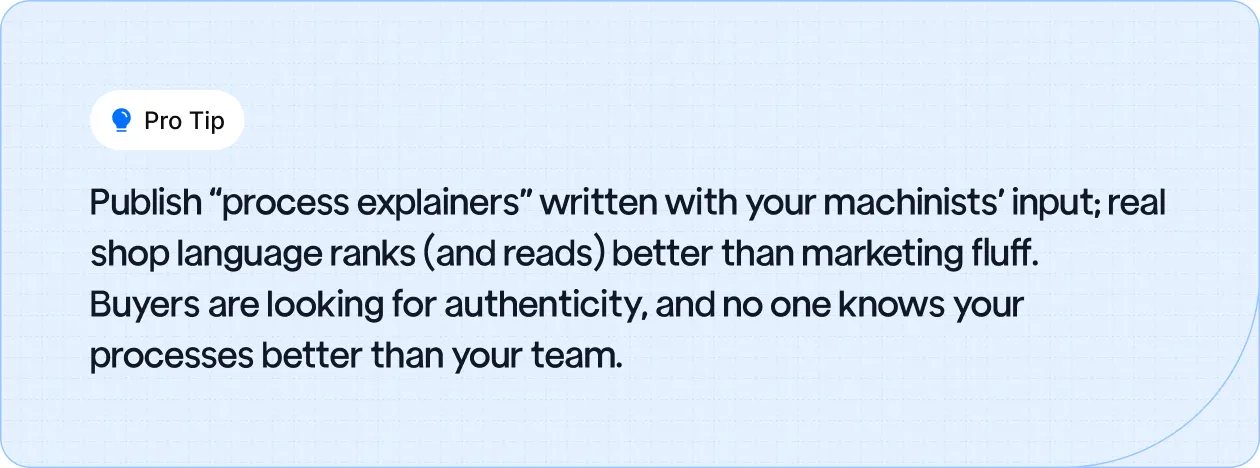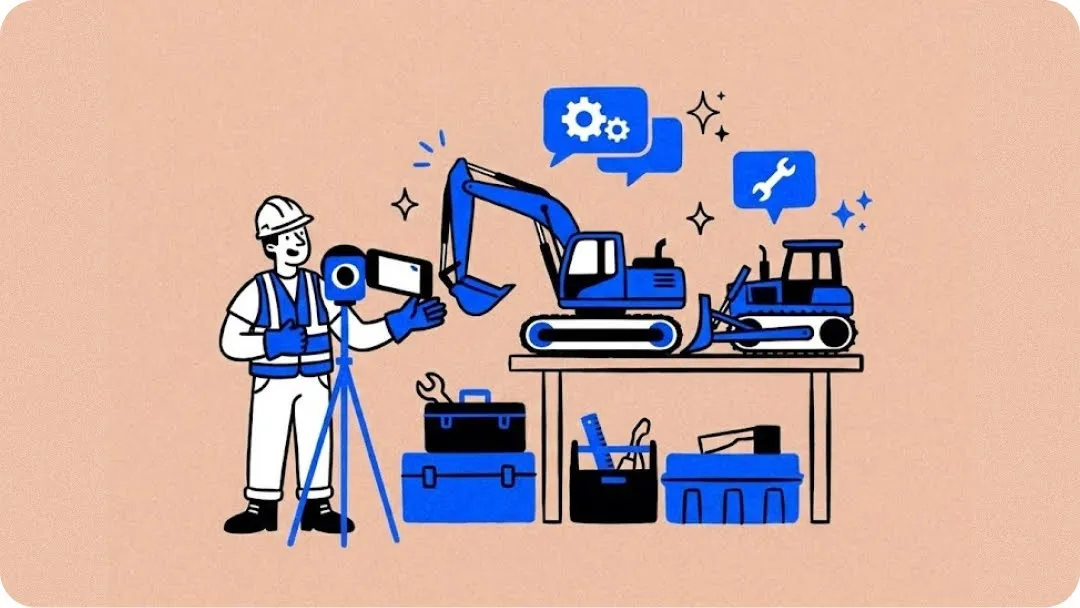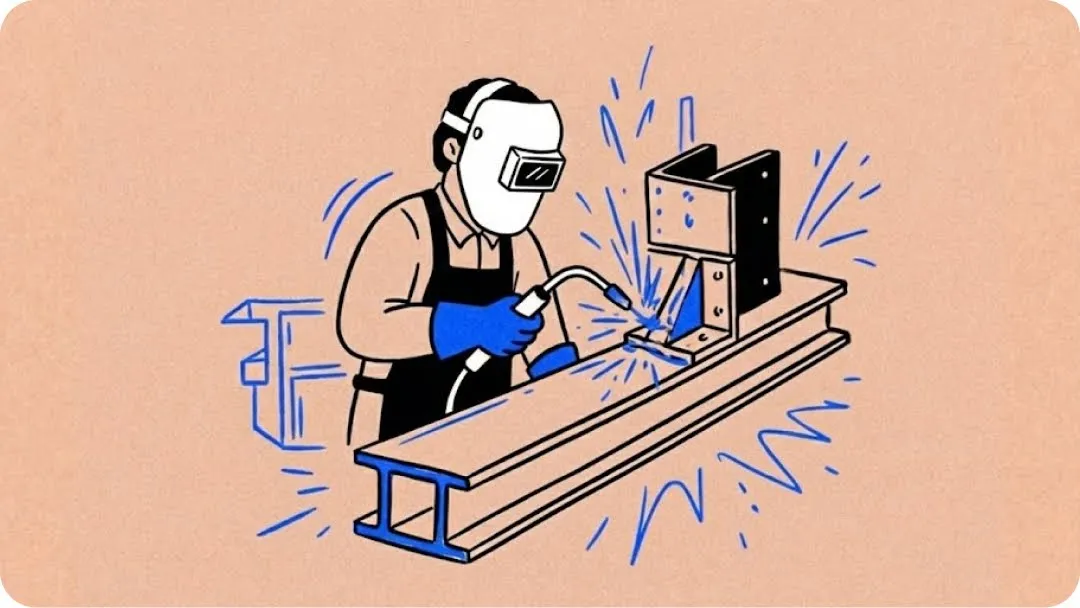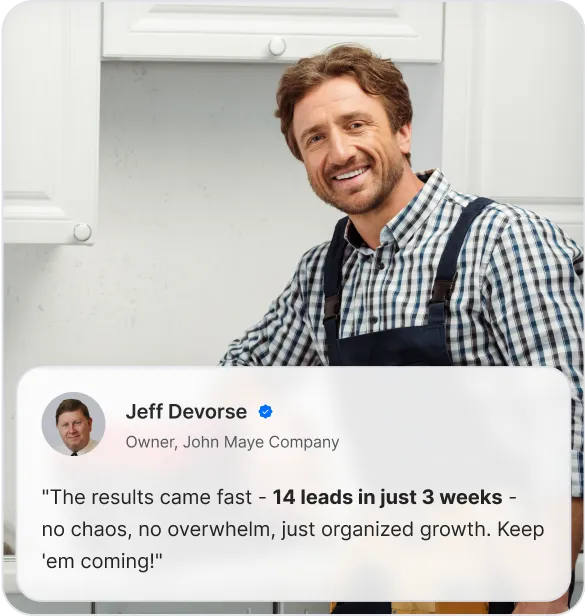For CNC companies, ranking on Google is about attracting the right buyers who understand the precision, material expertise, and capabilities that go into your work.
But here’s the problem: With so many generic SEO strategies out there, it's easy to waste resources targeting the wrong audience.
How often have you found yourself buried under a heap of irrelevant leads or disappointed by high traffic that doesn't convert into real leads?

This article is going to help you target the procurement teams, engineers, and decision-makers who are actively looking for precision machining services. Struggling to rank for industry-specific terms like “CNC aerospace machining”? Not showing up when local buyers search for services nearby?
This guide will walk you through the SEO tactics that can help your shop rise above the competition.
Why SEO Is the Missing Gear in Your CNC Growth Strategy?
Your CNC shop may have the best machines, tightest tolerances, and fastest turnaround, but if potential buyers can't find you online, you’re leaving valuable leads on the table. SEO for CNC companies is about attracting the right buyers who are actively searching for the services you provide.
Without effective SEO, you might be competing in the dark while your competitors get the spotlight.
- Buyers are no longer walking into your shop; they’re searching online
The days of relying on foot traffic or word-of-mouth are over. Engineers, procurement managers, and OEMs now begin their buying process with a Google search.
If your shop doesn't appear for relevant queries, high-quality leads who are ready to engage are being missed.
- Engineers trust Google before they trust suppliers
Google’s search results are seen as a form of validation. When buyers are looking for CNC machining services, they will trust what Google ranks higher, assuming that businesses with strong search visibility are more credible.
If your shop needs to be ranked high enough, or if your credibility might be questioned.
- The real ROI of SEO: more leads, fewer cold calls
The beauty of SEO is its ability to generate inbound leads. An optimized website attracts high-quality leads actively searching for your services, not cold calls.

Know Who’s Googling You, And What They Actually Want
Different buyers search differently. Engineers care about technical specifications, procurement managers focus on cost and reliability, and OEMs care about scalability and timelines.
Understanding these different needs and aligning your content with buyer intent will ensure your SEO strategy is effective.
Engineers, procurement heads, and OEM buyers all search differently
Engineers are often focused on specific capabilities, like “precision CNC machining” or “tolerance for titanium parts.” Procurement heads might search for “best CNC machining service providers for medical components.”
Meanwhile, OEMs may search for “custom CNC manufacturing solutions” that can scale with their operations.
“CNC milling near me” is a query with buying intent
Local SEO is powerful for CNC companies. When buyers search for “CNC milling in [city]” or “CNC machining near me,” they’re browsing with the intent to make a decision.
Optimizing for local keywords will help your shop rank for these high-conversion queries.
Match your content to their intent (research, compare, or buy)
Some users are in the research phase, looking for general information about CNC machining. Others are comparing prices or services. The most valuable leads, however, are those actively looking to buy.
Tailor your content based on the buyer's stage in their decision-making process.

Focus on Keywords That Drive Revenue, Not Just Traffic

Create a Website That Runs as Smoothly as Your CNC Machines
Your website is your digital storefront, and just like your CNC machines, it needs to operate smoothly for optimal results. A well-structured website not only attracts traffic but also converts visitors into leads.
A website that lacks user-friendliness means losing potential customers who can’t easily find what they’re looking for.
- One page per service, no more “everything in one” pages
Every service you offer should have its own dedicated page. Avoid cramming all your services into one page. By creating separate pages for “CNC turning,” “CNC milling,” etc., you increase your chances of ranking for those specific keywords.
- Group pages by industries, not just machines
Instead of just listing your machines, create pages dedicated to specific industries, like “CNC machining for aerospace” or “medical device CNC machining.” This helps Google understand your expertise and rank you for industry-specific searches.
- Use internal links like a toolpath, guide users from the blog to the lead
A strong internal linking strategy improves both SEO and user experience. Link your blog posts to relevant service pages to guide users through their journey and increase engagement on your site.

Craft Pages That Speak to Engineers (Not Algorithms)
Engineers don’t care about fluff; they want specifics. Your website should focus on providing clear, detailed, and accurate information about your CNC capabilities. Crafting content with technical depth not only attracts engineers but also helps you rank better on Google.
Write like you’re explaining tolerances, clear, specific, and confident
When describing your services, be precise. Instead of saying "high precision," use exact terms like "±0.001 mm tolerance."
This builds trust with engineers who need to know you can meet their exact specifications.
Show specs, machines, and materials, not buzzwords
Skip the fluff. Engineers want to see the specifications of your machines, the types of materials you work with, and the exact processes you use. Providing these details will help your site rank higher and build credibility.
Add visuals: part photos, CMM reports, 3D renders, show proof
Visual proof can be a powerful way to showcase your work. Add images of parts, reports, and 3D models to give engineers a clear understanding of your capabilities.
Place CTAs smartly, “Upload Drawing” beats “Contact Us” any day
Engineers don’t want to fill out long forms. Make it easy for them to submit their designs with a simple “Upload Drawing” button. This encourages quicker conversions.

Fix the Tech That’s Slowing Your Site (and Sales)
Your website is like a CNC machine; it needs precision and speed to deliver the best results. If your website isn’t performing optimally, it could be costing you leads, no matter how great your shop is.
Slow load times, unoptimized images, and poor mobile functionality can all negatively impact user experience and SEO.
Fast-loading pages win trust, slow sites lose leads
In today’s fast-paced digital world, buyers expect websites to load quickly. If your site takes longer than 3 seconds to load, you risk losing potential leads.
- Key Action: Test your website speed regularly using Google PageSpeed Insights or GTMetrix.
- Bonus Tip: Reduce HTTP requests and minimize JavaScript to improve loading times.
Optimize those massive part images without losing clarity
Part images are essential to showcasing your CNC capabilities, but they can slow your site down. Optimizing them for web use without compromising quality is key.
- Actionable Tip: Use WebP format for images, which reduces file size without sacrificing quality.
- Bonus Tip: Apply lazy loading for images, meaning images only load when they are in the visitor’s view.
Keep your site mobile-ready, buyers browse from shop floors, too
More potential clients are browsing from their phones, on the shop floor or commuting. If your site lacks mobile-friendliness, a significant chunk of your audience is being missed.
- Actionable Tip: Test your site’s mobile-friendliness using Google’s Mobile-Friendly Test.
- Bonus Tip: Responsive design ensures your content adjusts seamlessly across all devices, improving engagement.

Own Your Territory with Local SEO
If your CNC shop serves specific regions, local SEO is your key to standing out and attracting buyers who are searching locally.
By optimizing for local searches, you can capture more high-quality leads from your own backyard and increase your competitive edge.
Update your Google Business Profile, your digital front gate
Your Google Business Profile (GBP) is often the first interaction potential buyers have with your shop. Make sure it's fully updated with:
- Accurate business hours, contact details, and service offerings.
- High-quality real photos of your shop and completed projects.
- A compelling business description that includes local keywords like “CNC machining in [City].”
Add photos, services, and real job shots, no stock images
Authenticity is crucial. Buyers want to see the real work behind your services. Use:
- Before-and-after project photos.
- Images of your team at work and completed parts.
- Authentic job shots instead of generic stock photos to build trust.
Create “city-specific” pages, your local ranking goldmine
Target local markets with dedicated landing pages for each region you serve:
- Use location-based keywords (e.g., “CNC machining in [City]”).
- Include local testimonials and case studies to build relevance.

Make Your Content Do the Talking (and the Selling)
Content is a powerful tool for CNC shops to showcase expertise and attract highly qualified leads. Rather than just relying on traditional sales tactics, high-quality content can work 24/7 to engage potential buyers, answer their questions, and guide them towards making a decision.
Turn your process know-how into high-performing blog topics
Your CNC shop likely has a wealth of technical knowledge that can be turned into valuable content. Writing blog posts that explain the nuances of CNC machining, including CNC turning, precision milling, and tolerance specification, attracts buyers who are in the research phase of their decision-making process.
- Actionable Tip: Create step-by-step guides on processes your team handles daily. Topics like “How CNC Milling Works” or “The Importance of Tolerances in Precision Machining” will engage engineers and procurement managers looking for specific answers.
- Bonus Tip: Use long-tail keywords that reflect questions your audience is asking, such as “what is the best material for CNC machining?” These are often lower-competition but highly relevant to buyers actively searching.
Case studies = proof you deliver precision and reliability
There’s no better way to demonstrate your CNC shop’s capabilities than through real-world case studies. These provide social proof and showcase your success in solving complex challenges for clients. Buyers want to know your machining process works, and they want examples of it in action.
- Actionable Tip: Structure your case studies to include before-and-after photos, client testimonials, and measurable outcomes (e.g., “Reduced lead time by 20% for aerospace client”).
- Bonus Tip: Include industry-specific case studies (e.g., aerospace, automotive, or medical) to appeal to a broader range of targeted buyers, positioning your shop as a specialist in their field.
Create link-worthy content, tolerance charts, machining guides, checklists
Content like tolerance charts, machining guides, and checklists not only help your audience but also increases the chances of other websites linking back to you. When you create useful resources that others in your industry find valuable, they’ll link to your content, boosting your SEO rankings.
- Actionable Tip: Develop downloadable resources such as machining tolerance charts or step-by-step CNC setup guides that engineers can use regularly.
- Bonus Tip: Promote these resources through guest blog posts, social media, and industry forums to increase the chances of earning backlinks.

Don’t Just Rank: Convert Every Click Into a Lead
Traffic is great, but conversions are what matter. Your website should guide visitors to become qualified leads, requesting a quote or learning more about your services.
Here’s how to convert clicks into meaningful business.
Make your lead forms engineer-friendly, upload options, NDAs, and fast replies
Engineers value efficiency. Make your lead forms simple with file upload options for drawings, NDAs, and fast replies.
- Tip: Allow CAD uploads and ensure your forms are quick to fill out.
- Bonus: Auto-reply confirmations set clear expectations.
Flaunt your certifications and industries served upfront
Showcase your ISO certifications and highlight industries you serve (aerospace, medical, automotive).
- Tip: Display your industry credentials on the homepage and service pages for quick visibility.
- Bonus: Add client logos for added credibility.
Use social proof, project photos, before-and-after shots, and testimonials
Case studies and project photos provide concrete evidence of your CNC shop’s capabilities.
- Tip: Show before-and-after photos of your work to highlight precision.
- Bonus: Add client testimonials or video reviews for personal trust-building.

Set expectations for fast responses. A “response time badge” encourages users to submit their details, knowing they’ll receive a quick follow-up.
Focus on What Drives Results and Drop What’s Holding You Back
If you’re not measuring the right metrics, you’re guessing. Traffic doesn’t always equal leads. To succeed, focus on conversions. By tracking real KPIs, you can optimize your strategy for better results.
Measure the right metrics, not vanity traffic
Stop focusing on page views and bounce rates. What matters is conversions, how many visitors are turning into leads.
- Track these KPIs: Conversion rate, lead quality, and customer acquisition cost.
- Bonus Tip: Set conversion goals in Google Analytics to track form submissions and phone calls.
Use GA4, Search Console, and call tracking like audit tools
Tools like GA4, Search Console, and call tracking help you understand what’s working and where to optimize.
- Track leads and form completions using GA4’s custom reports.
- Bonus Tip: Set up call tracking to identify which channels are driving phone leads.
Review your wins quarterly, adjust like a machinist, fine-tuning a part
You need to review your performance every three months to see what’s driving the most conversions and adjust your strategy.
Actionable Tip: Set new goals based on quarterly performance reviews and competitor analysis.

Mistakes Most CNC Shops Make (and How to Fix Them)
These common mistakes are costing you leads, but they’re easy to fix. Let’s take a look at the issues and how to avoid them.
Using jargon-heavy content, no buyer understands
CNC buyers don’t need technical jargon; they need clear, simple explanations of your services.
- Actionable Tip: Use plain language to explain processes like CNC milling or prototyping.
- Bonus Tip: Break down complex topics with infographics or step-by-step guides.
Overlooking local search, while competitors dominate
Many CNC shops focus on national SEO and ignore local search. Optimize for location-based keywords to attract regional customers.
- Actionable Tip: Add city-specific pages and optimize your Google Business Profile (GBP).
- Bonus Tip: Respond to Google reviews to increase local engagement.
Treating SEO like a one-time setup, not a process
SEO is a continuous process. Regular updates and audits are necessary to stay competitive.
- Actionable Tip: Conduct quarterly SEO reviews and update content.
- Bonus Tip: Add new case studies or projects to keep content fresh and relevant.

What’s Next: Where CNC SEO Is Headed?
SEO is always evolving, and so should your strategy. What worked yesterday might not deliver results tomorrow. As technology advances and search behaviors change, it’s crucial to adapt your approach to stay ahead of the competition.
AI-generated content vs. real engineering expertise
AI can generate content, but when it comes to CNC, nothing beats the real engineering expertise you bring.
Search engines are evolving to favor authentic and knowledgeable content. Emphasize your team's experience and technical knowledge to differentiate your content from generic alternatives.
Voice search (“Hey Google, CNC shop near me”) is rising
With the rise of voice search, the way people search for CNC services is changing. Phrases like “CNC shop near me” are becoming more common, so ensure your website is optimized for local SEO and voice-based queries.
Tailoring your content to conversational keywords will help you rank higher for these voice searches.
3D visuals, the new trust factor in industrial SEO
As the digital world becomes more immersive, 3D visuals are gaining traction in industrial SEO.
Including interactive images, 3D renders, or even virtual tours of your CNC processes can set you apart, build trust, and engage potential clients in a more meaningful way.

Taking Your CNC SEO to the Next Level
To truly dominate the SEO landscape in the CNC industry, you must stay ahead of emerging trends and adapt to changes as they happen.
AI-generated content, voice search, and 3D visuals are shaping the future, but only if your strategy remains flexible and forward-thinking. The problem is converting that ranking into real leads.
FAQs
Q1: How can I effectively market my CNC shop online?
A1: Focus on local SEO by optimizing your Google Business Profile, creating location-specific landing pages, and gathering customer reviews. Additionally, share real project photos and detailed case studies to build trust.
Q2: What are the common challenges when starting a CNC business?
A2: Unexpected costs, noise, space requirements, and the unpredictability of product demand are common hurdles. It's essential to plan for these factors to ensure business sustainability.
Q3: How do I determine pricing for CNC machining services?
A3: Pricing can be based on material costs, machine time, labor, and overhead. Some shops use quoting software or develop custom Excel calculators to estimate costs.
Q4: What makes buyers respond to a CNC supplier's outreach?
A4: Buyers are more likely to engage when they find relevant content, clear capabilities, and a user-friendly website. Effective SEO practices can enhance visibility and attract potential clients.
Q5: What are the benefits of having a niche in the CNC industry?
A5: Specializing allows for better quality control, faster turnaround, and the ability to cater to specific customer needs, which can lead to a more loyal client base.
Q6: How can I improve my CNC shop's online presence?
A6: Regularly update your website with fresh content, optimize for mobile devices, and ensure fast loading times. Engaging with customers through blogs and social media can also boost visibility.
Q7: What are the key factors in choosing CNC quoting software?
A7: Consider ease of use, integration with existing systems, accuracy in cost estimation, and scalability to match your business growth. Some shops prefer open-source solutions, while others opt for specialized paid software.





















.webp)








.webp)
.svg)


.svg)
.svg)
.svg)




.svg)


